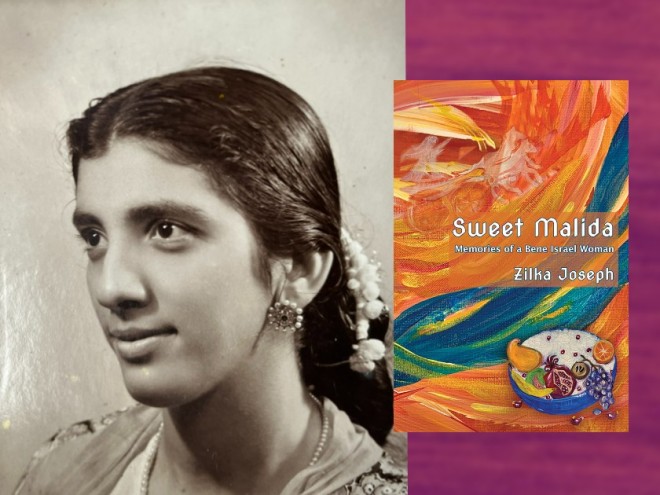Zilka Joseph’s Sweet Malida takes a deep poetic dive into the Bene Israel, the oldest of three traditional Jewish communities in India. Joseph was born in Mumbai and grew up in Kolkata, where she was part of the Bene Israel. She moved to the US with her husband when she was in her mid-thirties. She describes the Bene Israel’s food, community, and history in language that is both evocative and accessible, and often filled with longing for the culture she left behind.
At her best, Joseph weaves together recipes and descriptions of food with stories about her family. For example, in “Kaulee Haddi,” she writes about a special dish her father fed her and her sister when they returned home:
… But he rarely
ate it, breaking off that kaulee tip
with his wiry engineer fingers
salty with memories
of sea, flecked with rice and curry,
so that even when we were grown,
and especially
when we returned to visit, he fed
my sister, or me the precious kaulee haddi.
Joseph offers several theories about the origins of her ancestors. The most popular one, she says, is that they were fleeing the rule of the Greek overlord Epiphanies in 175 B.C.E. and were shipwrecked on the west coast of India. The estimated population of the Bene Israel in India today is about 3,500, and the global population is about 95,000. A central figure in their religion is the Prophet Elijah. In the first poem in the book, “Eliyahoo Hanabi,” Joseph praises him using the local culinary delights:
Let us heap the sugar-sprinkled poha
tall as a pyramid, mixed with shredded
coconut, precious dried fruit and nuts,
scented with the most fragrant
of spices …
Food is clearly the central image of this book, and it’s often described in mouth-watering ways. Native dishes become a metaphor for the gifts that are handed down from one generation to the next — as well as those gifts that are lost. In a prose piece towards the end of the book, Joseph mentions her parents and grandmother, and how their love “wrapped around me like these aromas.” At the end of the piece, she asks for their forgiveness “for not writing down their recipes, their magic words.”
The reader is clearly the beneficiary here: perhaps if all the recipes had been written down, Joseph would not have been compelled to write these lovely poems.
Stewart Florsheim’s poetry has been widely published in magazines and anthologies. He was the editor of Ghosts of the Holocaust, an anthology of poetry by children of Holocaust survivors (Wayne State University Press, 1989). He wrote the poetry chapbook, The Girl Eating Oysters (2River, 2004). In 2005, Stewart won the Blue Light Book Award for The Short Fall From Grace (Blue Light Press, 2006). His collection, A Split Second of Light, was published by Blue Light Press in 2011 and received an Honorable Mention in the San Francisco Book Festival, honoring the best books published in the Spring of 2011. Stewart’s new collection, Amusing the Angels, won the Blue Light Book Award in 2022.





